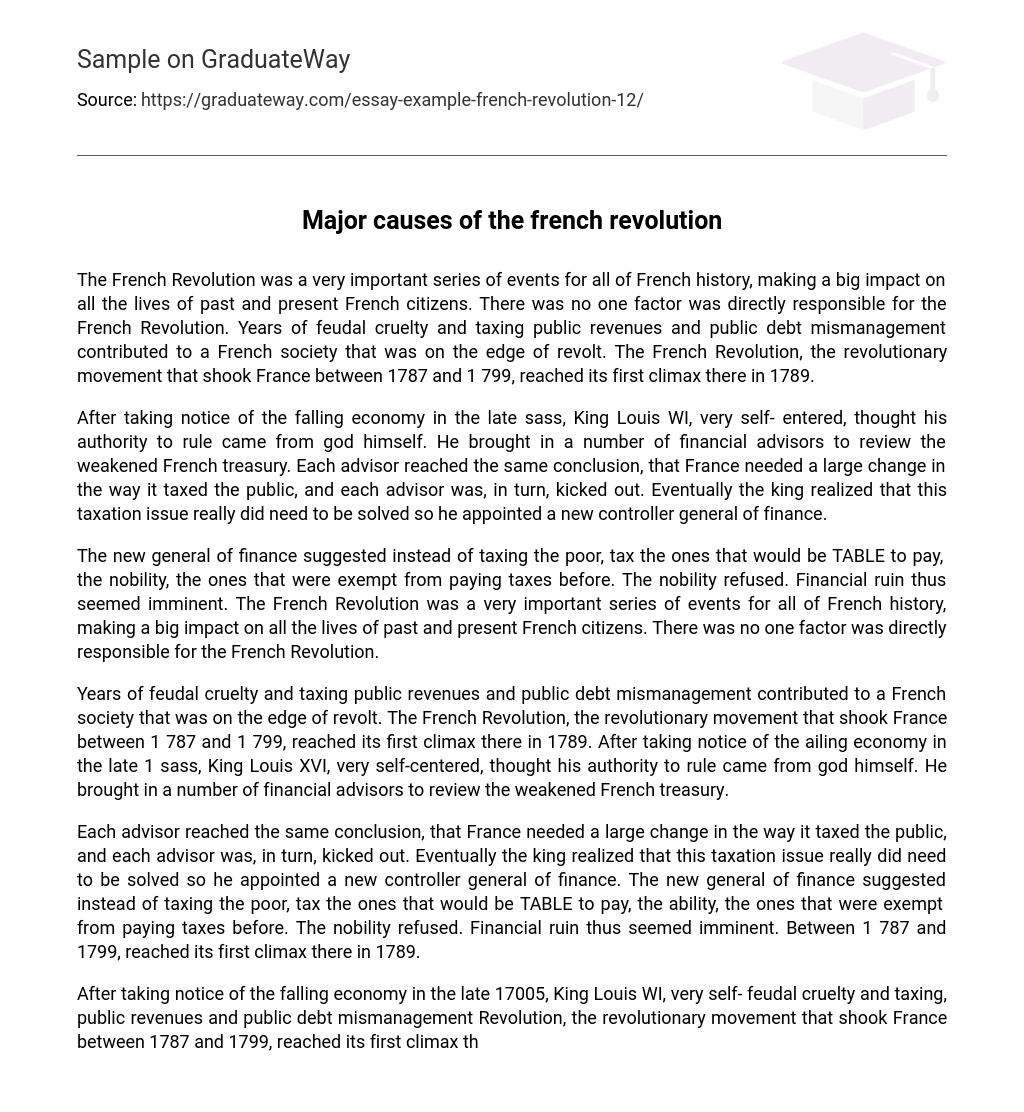The French Revolution had a significant impact on the lives of past and present French citizens, serving as a pivotal period in French history. It was not triggered by a single cause but rather emerged from a mixture of feudal oppression, burdensome taxes, mishandling of public finances, and indebtedness. These factors collectively pushed French society to the brink of uprising. The revolutionary movement, known as the French Revolution, began in 1787 and peaked in 1789.
In the late sass, King Louis WI became aware of the declining economy. Being very self-centered, he believed his authority to rule came directly from god. In an effort to address the weakened French treasury, he hired multiple financial advisors for their expertise. Interestingly, all of them agreed that France required a significant modification in its taxation system. However, the king dismissed each advisor in succession. It was not until later that he acknowledged the urgency of resolving this taxation issue and subsequently appointed a new controller general of finance.
The new finance general put forth a fresh perspective on taxation, advocating for a redistributive approach that would alleviate the burden on the poor and shift it onto the nobility, who had previously been exempt. Unfortunately, this proposal was met with rejection by the nobility, leading France to face an imminent threat of financial collapse. This critical juncture in French history, commonly referred to as the French Revolution, had far-reaching implications for both past and present inhabitants of France. It is crucial to highlight that various factors collectively contributed to triggering the French Revolution.
France teetered on the edge of rebellion due to years of feudal cruelty and mishandling of public funds. The French Revolution took place from 1787 to 1799, with a significant turning point in 1789. King Louis XVI, renowned for his egocentrism and faith in divine power, became conscious of the declining economy in the late 17th century. In an effort to tackle this problem, he designated financial advisors to assess the weakened condition of the French treasury.
Each advisor came to the same conclusion: France needed a significant change in its taxation system. However, each advisor was subsequently dismissed. Eventually, the king recognized the urgency of resolving the taxation issue and appointed a new controller general of finance. The new general proposed a different approach: instead of burdening the poor, tax those who have the means to pay, specifically the privileged individuals exempt from taxes previously. However, the nobility rejected this suggestion. As a result, financial ruin appeared imminent. The situation reached its first critical point between 1787 and 1799, culminating in 1789.
In the late 1700s, King Louis WI became aware of the declining economy which caused the French Revolution to occur between 1787 and 1799. Known for his feudal cruelty and excessive taxing, King Louis WI mismanaged public revenues and debt, resulting in a financial crisis. The revolution reached its peak in 1789 and had a significant impact on French history, shaping the lives of both past and present citizens.
The French Revolution, occurring from 1787 to 1799, was caused by multiple factors such as feudal cruelty, excessive taxation, mismanagement of public finances and debt. These issues led to a society in France on the verge of rebellion. In 1789, the revolution reached its first peak when King Louis XVI, primarily concerned with his own interests, became aware of the declining economy during the late 17th century. Believing in his divine right to rule, he sought help from various financial advisors to assess the weakened state of the French treasury.
Every advisor concluded that France required a major overhaul in its taxation system. However, each advisor was subsequently dismissed. Finally, the king acknowledged the urgency of resolving the taxation problem and appointed a new controller general of finance. The new general proposed a solution: instead of burdening the poor, the tax should be imposed on those who are capable of paying, namely the nobility who were previously exempt. The nobility, however, rejected this proposition. As a result, financial ruin appeared inevitable.





